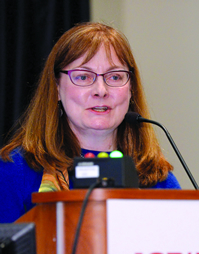
The humanities come in many forms — literature, music, art, and nature, to name a few — and give perspective on what it means to be human. They are also rich in what they can offer patients and healthcare professionals, said ARHP keynote speaker Paulette C. Hahn, MD, on Sunday morning.
“There are four words that actually help me think about the humanities on a day-to-day basis, and that would have to be: Contemplative, curious, collaborative, and also be creative, and I think the first three actually help us be creative together,” said Dr. Hahn, Associate Professor of Medicine and Associate Vice Chair of Education in the Department of Medicine at the University of Florida, during the ARHP Keynote Address: Culture, Health, Healing: Humanities in Inter-Professional Collaboration and Patient-Centered Care.
Dr. Hahn said that everyone involved in a healthcare team should strive for these qualities. She proposed that, instead of focusing on the patient or the disease, put health and well-being at the center and bring the patient to the table along with the entire team of physicians, nurses, therapists, pharmacists, family, and friends so that they all reason and make decisions together.
In some ways, rheumatology is particularly poised among medical fields to incorporate perspectives from the humanities, Dr. Hahn said. Rheumatologists and rheumatology health professionals treat systemic diseases, not just inflamed joints. They want to move their patients’ well-being forward, and they tend to be inquisitive.
“We also look at hands, and… it tells us a lot about the stories of patients if you truly look at hands,” she said.
Telling a story is a fundamental part of the humanities, and Dr. Hahn discussed how she and other health professionals use narrative medicine to care for and understand their patients and grow as doctors. One example is the Arnold P. Gold Humanism Society’s “Tell Me More” project, which helps providers start a conversation with their patients about who they are and what is important to them.
Dr. Hahn opened her talk by sharing the story of Monica, a young woman she cared for who had severe progressive inflammatory muscle disease and lung disease. Despite her illness, “she had this incredible joy for life and this very quiet urgency about life,” Dr. Hahn said. It was very important to Monica to graduate from the University of Florida, and although she passed away one semester before graduation, the administration awarded Monica a diploma.
“[Monica] taught me how to slow down, she gave me this quiet sense of urgency in a way that was a calming urgency. I wanted to truly experience every single solitary day to its fullest and not worry about the things you cannot do,” Dr. Hahn said.
Dr. Hahn leads an elective course for fourth-year medical students about slowing down and observing patients more deeply, through practical lessons and the humanities. The students accompany her on patient rounds, and she teaches them to pause before going into a patient’s room to collect themselves so they can truly be present. This type of course is becoming more common at medical schools, Dr. Hahn said.
During the question period following the talk, an audience member asked how to move away from the rushed mindset that prevails in medical training and practice. Dr. Hahn agreed it is a difficult balance, and underscored how important it is for providers to create quiet time for themselves.
Several attendees shared ideas about how to use the humanities to improve care, such as receptionists could select poems they like and post them in the waiting room. One physician said he makes himself stop talking so patients have the chance to speak and asks patients what their most recent stressor is. Dr. Hahn said she often gives patients pieces of paper, and through reading the words they write, she has realized it is not the disease that worries them, but other stressors their illness magnifies.
